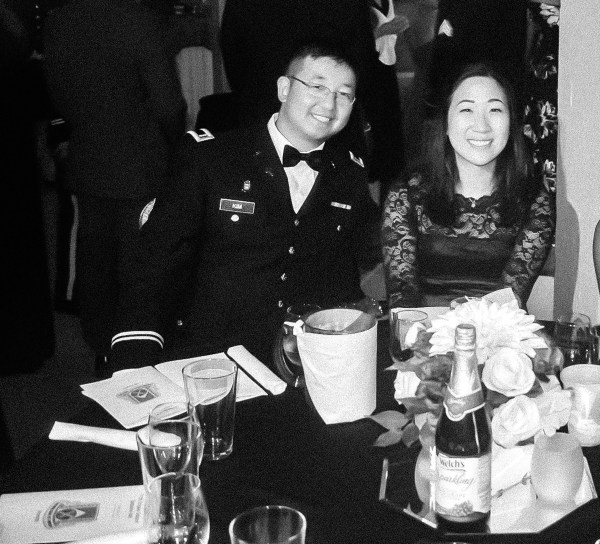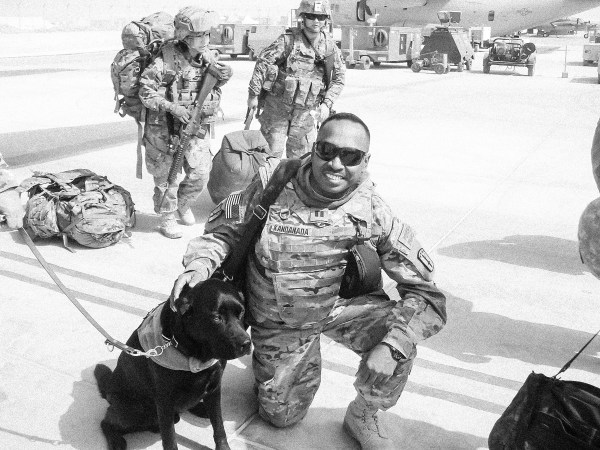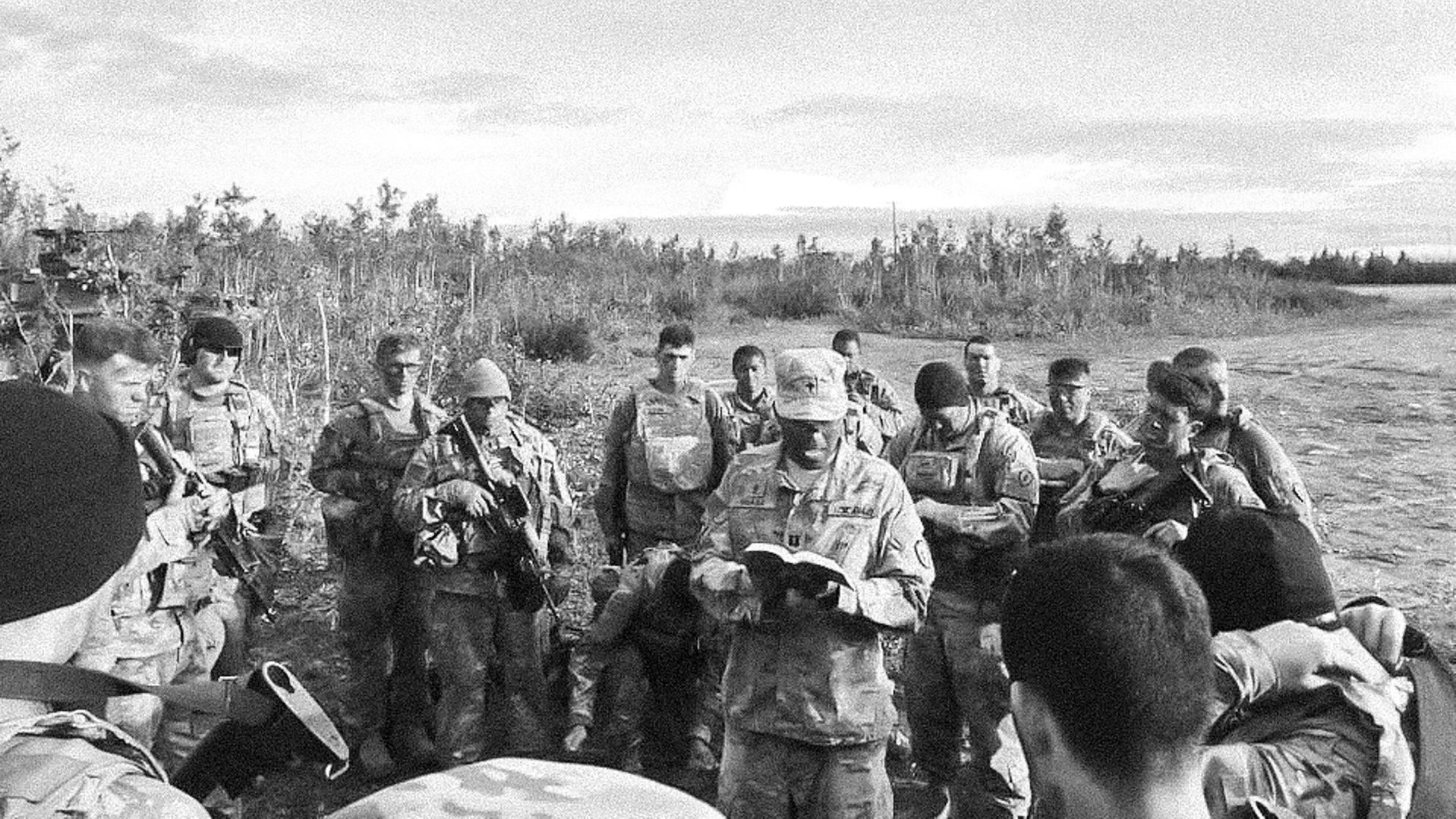As the sun warms the horizon, a platoon of soldiers huddles up on a gravel road in Fort Leonard Wood, Missouri. Thumps of artillery become background noise as units practice on the nearby range. A few wisecracks start off the morning, along with some last instructions before the ruck march. Then Cornelius Muasa’s voice rises over the soldiers’ to ask a blessing on their day’s tasks, the chaplain carefully articulating the English words that are challenging after his native Kenyan tongue of Kikamba.
Growing up as a stuttering pastor’s kid in Africa, Muasa never imagined he would one day be serving God in the American military. But the Lord led him from a Kenyan church to a United States seminary to discover a global calling and a burden for soldiers.
Muasa is one of many foreign-born evangelical chaplains whose experiences have equipped them to minister to the growing diversity of the US and the American military. Nineteen percent of US Army chaplains and 10 percent of Navy chaplains were born outside the US, according to military spokesmen (The Air Force did not respond to CT’s request for data). These include Buddhists from East Asia, Roman Catholics from Europe, Muslims from Africa, and many evangelical Christians like Muasa from around the world.
Diversity drew Muasa to this ministry, and it’s why he loves it. There are about 1.3 million active-duty personnel in the US military, and the service members are more diverse than they’ve ever been—16 percent black, 16 percent Hispanic, 4 percent Asian, and about 5 percent who are immigrants to America.
“Ministering to American soldiers presents an opportunity like no other ministry,” Muasa said. “We can minister to individuals from all faiths and all nationalities. In the civilian population, I would have had to really go out of my way to find a Muslim, Hindu, Wiccan, and all the other religions. But in the military I can live out my faith among all these faiths, care for them in the name of Christ, and often share how my faith has helped me in trying times.”
The military chaplaincy puts intense demands on these ministers. Chaplains will move to a new job and duty station about every three years. They may deploy at any time. Starting lieutenant- or captain-ranked chaplains are each assigned to a battalion of 300 to 500 soldiers and their families.
This creates a very different work tempo than Muasa expected when he planned to become a Bible professor. He first came to America to attend Calvin Theological Seminary in Michigan. “My initial goal was graduate studies, but as a Christian, the Great Commission is at the center of everything I do,” he said. At Calvin, he heard military chaplain recruiters speak. He went from finding them intriguing to having a growing burden for the soldiers. He finished three master’s degrees and then commissioned into the Army.
In 2013, Muasa deployed with a transportation unit to Afghanistan. His unit experienced a lot of IEDs, injuries, and a soldier’s death. In that trial, he knew he was where he was supposed to be. He saw how he could help people “go from frustration [and] fear to being able to go out and do the mission,” Muasa said.
 Courtesy of Sebastian Kim
Courtesy of Sebastian KimForeign-born chaplains say their own diverse life experiences help them minister to soldiers. Sebastian Kim, who serves a battalion at Fort Polk, Louisiana, was born to Korean parents in Argentina. He moved to Brazil at age 7. This made him, he says, “a really confused kid,” but it also enabled him to learn Spanish, Korean, Portuguese, and English.
After studying theology at Gordon-Conwell Theological Seminary, Kim found God could use his multicultural background, his ability to speak multiple languages, and even his exposure to violence during his childhood in Brazil. The military could use them, too. “My call is to deal with brokenness and suffering,” he said.
Kim finds his language ability is especially useful as an Army chaplain: “Some soldiers open [up] better when they speak in their mother language. It’s like food—soul food.”
Raja Kandanada, a chaplain born in India, says it’s not just language that’s useful, but the entire experience of moving to an unfamiliar culture. Recruits are brought into military culture during 12 weeks of training and then are sent to a new state or even a foreign country.
 Courtesy of Raja Kandanada
Courtesy of Raja Kandanada“I can relate to the recruits to some degree, coming from India, leaving everything I knew, the family, and the struggles I faced in the new country,” said Kandanada, who currently works at the Pentagon as a family life chaplain. “As I share some common experiences with them, I can offer a word of hope, uplift their spirit, and ease their fears and frustrations.”
Mark A. Jumper, director of chaplaincy programs at Regent University, said this is a core concept of chaplaincy.
“All chaplains have to make a cultural addition of their receiving organization to their skill set. Foreign-born chaplains have already learned to navigate our culture,” he said.
That was certainly Muasa’s experience. Some of the hardships he faced became strengths as a chaplain.
“The initial challenge was cultural references went over my head,” he said. “An advantage is that I can bring a fresh perspective in biblically critiquing the culture. I can also . . . help others understand host nations’ cultural concerns.”
As immigrants to the US, these chaplains have also experienced racial prejudice. But they choose not to dwell on it. “I know that is not what America is about,” Muasa said.
Kandanada also experienced discrimination in India because of the caste system there. But in America, he experienced the divine love that transcends human boundaries.
“Although I was born in India, I was born again in the United States,” he said. “It is where I understood the meaning of God’s love.”
When Kandanada attended Bible school, he realized his call was “evolving, and it is global.” He became a pastor of immigrant congregations in Boston. When he spoke to a military recruiter, though, he started thinking about his debt to his adopted country.
“The American military has helped liberate the oppressed nations and deter the efforts of stronger nations that prey on weaker nations. I am glad that America offers that calming presence to those who wish to enjoy life,” Kandanada said.
That sense of mission and patriotism unites the chaplains with the soldiers they serve. The ministry is intense because the hardships are intense. Soldiers and their families deal with stress from life-and-death issues of war and the regular upheaval of moving, training, and deployment. In the midst of this, foreign-born chaplains have found a special calling.
“My job as a chaplain is to empower those who fight evil,” Muasa said. “America is my new home. This is one way of giving back for the opportunities, the blessings.”
Tonia Gütting is a freelance writer and the wife of a retired Army chaplain who is now a church planter with the Evangelical Covenant Church. She is a mother of three young adults and blogs at Sabbatics.
Have something to add? See something we missed? Share your feedback here.












